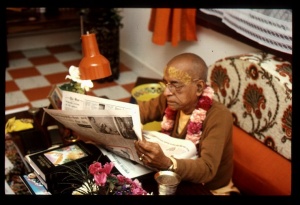CC Madhya 25.196

A.C. Bhaktivedanta Swami Prabhupada
TEXT 196
- keha kahe,—ei nahe, 'alpa' doṣa haya
- śuniyā rahilā rāya kariyā saṁśaya
SYNONYMS
keha kahe—some of the learned brāhmaṇas said; ei—this; nahe—not; alpa—insignificant; doṣa—fault; haya—is; śuniyā—hearing; rahilā—remained; rāya—Subuddhi Rāya; kariyā—making; saṁśaya—doubt.
TRANSLATION
When Subuddhi Rāya consulted some other brāhmaṇas, they told him that he had not committed a grievous fault and that consequently he should not drink hot ghee and give up his life. As a result, Subuddhi Rāya was doubtful about what to do.
PURPORT
This is another instance of Hindu custom. One brāhmaṇa would give advice condoning a particular fault, and another would give advice to the contrary. Typically, lawyers and physicians differ, giving one kind of instruction and then another. Due to the brāhmaṇas ' different opinions, Subuddhi Rāya became further perplexed. He did not know what to do or what not to do.